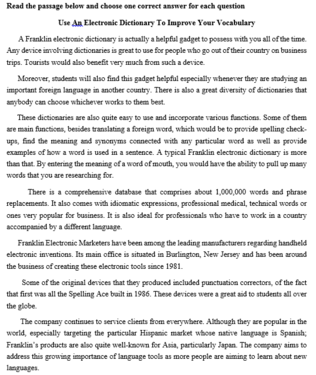Read the following passage and mark the letter A, B, C, or D on your answer sheet to indicate the correct answer to each of the following questions from 35 to 42. In the West, cartoons are used chiefly to make people laugh. The important feature of all these cartoons is the joke and the element of surprise which is contained. Even though it is very funny, a good cartoon is always based on close observation of a particular feature of life and usually has a serious purpose. Cartoons in the West...
Đọc tiếp
Read the following passage and mark the letter A, B, C, or D on your answer sheet to indicate the correct answer to each of the following questions from 35 to 42.
In the West, cartoons are used chiefly to make people laugh. The important feature of all these cartoons is the joke and the element of surprise which is contained. Even though it is very funny, a good cartoon is always based on close observation of a particular feature of life and usually has a serious purpose.
Cartoons in the West have been associated with political and social matters for many years. In wartime, for example, they proved to be an excellent way of spreading propaganda. Nowadays cartoons are often used to make short, sharp comments on politics and governments as well as on a variety of social matters. In this way, the modern cartoon has become a very powerful force in influencing people in Europe and the United States.
Unlike most American and European cartoons, however, many Chinese cartoon drawings in the past have also attempted to educate people, especially those who could not read and write. Such cartoons about the lives and sayings of great men in China have proved extremely useful in bringing education to illiterate and semiliterate people throughout China. Confucius, Mencius and Laozi have all appeared in very interesting stories presented in the form of cartoons. The cartoons themselves have thus served to illustrate the teachings of the Chinese sages in a very attractive way.
In this sense, many Chinese cartoons are different from Western cartoons in so far as they do not depend chiefly on telling jokes. Often, there is nothing to laugh at when you see Chinese cartoons. This is not their primary aim. In addition to commenting on serious political and social matters, Chinese cartoons have aimed at spreading the traditional Chinese thoughts and culture as widely as possible among the people.
Today, however, Chinese cartoons have an added part to play in spreading knowledge. They offer a very attractive and useful way of reaching people throughout the world, regardless of the particular country in which they live. Thus, through cartoons, the thoughts and teachings of the old Chinese philosophers and sages can now reach people who live in such countries as Britain, France, America, Japan, Malaysia or Australia and who are unfamiliar with the Chinese culture.
Until recently, the transfer of knowledge and culture has been overwhelmingly from the West to the East and not vice versa. By means of cartoons, however, publishing companies in Taiwan, Hong Kong and Singapore are now having success in correcting this imbalance between the East and the West.
Cartoons can overcome language barriers in all foreign countries. The vast increase in the popularity of these cartoons serves to illustrate the truth of Confucius’s famous saying “One picture is worth a thousand words.”
The word “chiefly” in paragraph 4 is closest in meaning to ______.
A. primarily
B. totally
C. hardly
D. relatively


Từ "chuyên gia" trong đoạn 4 là gần nhất trong ý nghĩa để ______.
A.những người giỏi ngôn ngữ
B.những người làm việc ở nước ngoài
C.những người thường sử dụng từ điển điện tử hiện đại
D.những người có trình độ học vấn và đào tạo cao
Thông tin : It is also ideal for professionals who have to work in a country accompanied by a different language.
=>The word “professionals” in paragraph 4 is closest in meaning to people who work in foreign countries.
Tạm dịch: Điều đó cũng là lý tưởng cho các chuyên gia phải làm việc ở một đất nước sử dụng kèm một ngôn ngữ khác.
Đáp án cần chọn là: B